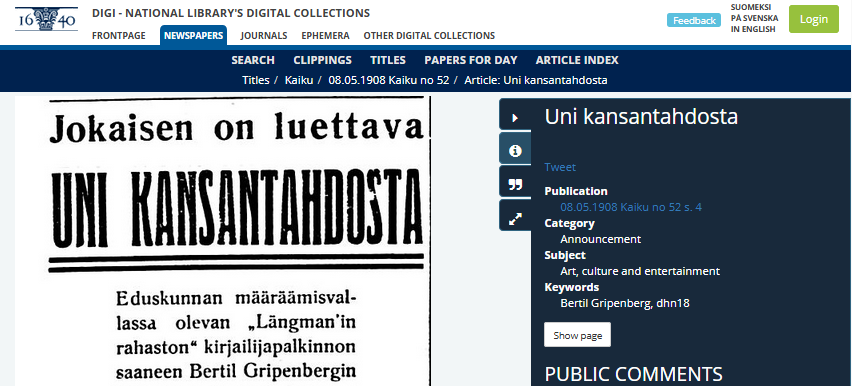As part of the DHN18 program minihistories workshop was held at the National Library of Finland. Unfortunately due to multiple reason were were quite few, which meant that we could focus more in depth to the similarities (and also differences between participant countries) with regard to access to data.
For example, we heard that e.g. in Iceland all the newspaper material is available freely online. When comparing to Finland the material until 1929 is available online (by special agreement for this year for the 1918-1929) and anything more recent is available in the legal deposit libraries in six locations in Finland.

In the workshop we also came up with an idea to expand the usage of wikidata in new ways. As institutions have specific procedures how material is got to the collections , wikis can act as a way to capture the local information, e.g. to wikipedia and even if that is not suitable then via on wiki location where the specific interest area is covered. As discussed there seem to be existing evidence that end-users are already collecting this local information either to social media pages, own websites , so in many different locations.
For the library point of view, our workshop came to conclusion that there is actually four generations of library users (to simplify it greatly).
- First generation is the one who wants to use the paper originals and visit the library and reading rooms.
- Second generation have or are using the microfilm scanners and access the material in that way
- Third generation is the one who utilizes the digital materials , combining and manipulating them
- Fourth generation is the maybe digihumanist era, when data is utilized in text and data mining, multiple sources combined in own tools.
We actually tried to think for the 5th generation, is it then when all material is interlinked and accessed, utilizing multiple sources and innovative ways to search. The change of users and ways of utilizing the data is also one way illustrating the changing role of library – different usages requires knowledge in data science, cleaning up, fixing up data in order to ensure that there would be complete sets of information. As there were examples in our workshop that even researcher access to the needed information in digital format can be a challenge (material might not be digitized, or it cannot be shared and can only be used on-site and so forth). For library people this means that there is need to think the role between the contents and research – how to stay in contact with researchers and ensure that materials would be used as much as possible and so that information could be combined from multiple sources. For example wikidata has very good potential to combine different sources e.g. via mixn’match tool, which allows anyone to link matching items, based on insight they have.
As a summary each generation will look at the data in their own way, and find new ways to utilize them, so this is something to wait for.
Thanks for all participants, and hopefully everyone enjoys their conference onwards!
